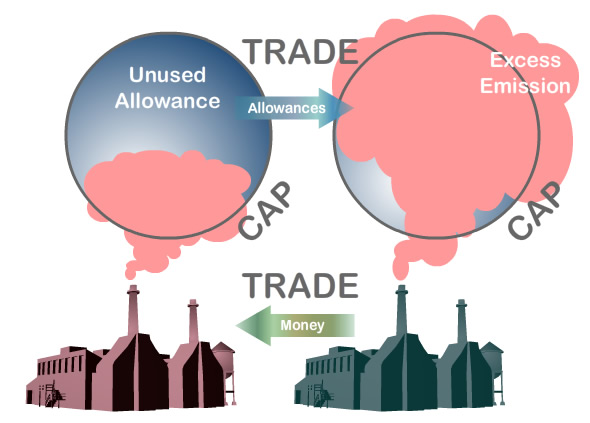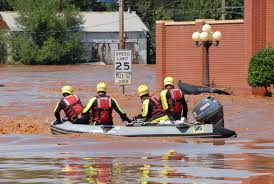Major Challenges Face the National Park Service in Its Next Century
Park Overcrowding, Crumbling Infrastructure, Changing Constituency Top the List
(This is the third in a series of posts this week commemorating the 100th anniversary of the creation of the National Park Service.) To be sure, the National Park Service has much to celebrate as it observes its 100th birthday. The Park Service oversees a stunning and diverse set of national parks, monuments, historic and cultural sites that are the envy of other nations and people around the world. But the Service confronts a wide array of challenges as it begin...
CONTINUE READINGDoes AB 197 Mean the End of Cap and Trade in California?
Language Directs the Air Resources Board to Prioritize Direct Emissions Reductions
As Ethan's post recounts, the California Assembly today passed AB 197, a bill linked to SB 32, which extends California's climate goals to 2030 and requires emissions reductions by that year of 40 percent below 1990 levels (see my post from yesterday describing the bills and how they are linked). The passage of the two bills is a huge victory for the Governor and will continue the state's global leadership on climate change. AB 197 does, however, have the potential...
CONTINUE READINGBREAKING NEWS: Final Hurdle For California’s 2030 Climate Bill Passes Assembly
Governor vows to sign AB 197, SB 32's "conjoined twin"
There was a bit of added drama to the passing of SB 32 yesterday in the California Assembly, as the passage was dependent on the state enacting AB 197. The Assembly debated AB 197 this morning, and it passed out of the natural resources committee with six votes in favor and one opposed. It then headed to the assembly floor where it just passed 44 votes in favor, 28 opposed. The governor has vowed to sign it. As Ann described last night, AB 197 restricts some of ...
CONTINUE READINGThe (Relatively) Unknown Treasures of the National Park Service
Our National Park System Consists of Far More Than Just National Parks
When most Americans think of the National Park Service, they contemplate the nation's stellar collection of national parks: Yellowstone, Yosemite, the Everglades and the other 56 parks created by acts of Congress since 1872. But that's only part of the story and holdings of the National Park Service, which celebrates its 100th birthday this week. The Park Service in fact manages and operates a total of 412 units, located in all 50 states and the District of Columbia....
CONTINUE READINGSB 32 Passage Great News But Legislature Needs to Pass AB 197 Too
AB 197 Would Curtail California Air Resources Board Power, Potentially Restrict Cap-and-Trade
Ethan reported the good news today that the California Assembly passed SB 32, legislation that would extend California's landmark climate change legislation to 2030 and require deeper cuts in emissions. The original legislation, AB 32, required that California cut its emissions to 1990 levels by 2020. SB 32 requires that the state achieve a 40 percent reduction of the state's greenhouse gas emissions below 1990 levels by 2030. The Assembly vote today to pass SB 32 wa...
CONTINUE READINGBREAKING NEWS: California Assembly Passes SB 32, the 2030 Climate Bill
With governor's signature, the state will retain its international leadership position on reducing greenhouse gas emissions
It was a rough year in 2015 for SB 32 (Pavley), California's major climate bill to extend our greenhouse gas reduction efforts to 2030. The bill went down without a vote on the Assembly floor, due to opposition from "moderate" Democrats. But today, the Assembly passed the bill with 42 votes in favor, 29 opposed: This majority vote won't inoculate certain programs under AB 32, like cap-and-trade, from court challenges alleging that they constitute a tax requirin...
CONTINUE READINGLibertarian Candidate Endorses a Carbon Fee
Gary Johnson has put his weight behind
In an interview in Alaska, Gary Johnson endorsed the idea of a fee on carbon emissions. Here's what he had to say, according to E&E News: "Johnson described his "free market approach" to global warming to the Juneau Empire in an interview published this weekend. He said his plan would include a fee, "not a tax," placed on carbon, according to the newspaper." Just by coincidence, I blogged earlier today about a small government approach to a carbon fee. We ...
CONTINUE READINGA Small-Government Approach to Pricing Carbon
We can impose a price on carbon without a tax or emissions trading. Here's how.
Cap and dividend is a politically appealing idea; put a price on carbon, then refund the money to consumers in equal shares. But conservatives and libertarians object to this idea on two grounds. First, cap-and-trade systems are complex and require a lot of regulatory oversight. Second, if the government collects the money, despite its current promises to do so, it may be unable to resist the temptation to tap the funds for other purposes. Thus, cap and dividend co...
CONTINUE READINGCalifornia Supreme Court Holds Unanimously that the State May Restrict Mining Methods on Federal Lands
Court in People v. Rinehart Upholds State Moratorium on Suction-Dredge Mining
Last year, as I discussed in a prior post, the California Supreme Court granted the State of California's petition for review in the case of People v. Rinehart. I'm pleased to say that today, the Supreme Court has issued a unanimous opinion, authored by Justice Werdegar, in favor of the state's moratorium on suction-dredge mining on federal lands. This opinion confirms that states may exercise robust regulatory authority over mining in National Forests and on oth...
CONTINUE READINGLouisiana Flood Lessons for a Climate-Changed Future
Louisiana's preparedness for a 1000-year flood, and implications of the slow media response for slow-onset climate impacts
The devastating floods in southern Louisiana a week ago left at least 13 people dead, tens of thousands in need of rescue, and 60,000 homes damaged. In one parish, nearly ninety percent of homes flooded. Cellular network failures, road closures, power outages, and sewage-contaminated floodwaters continue to threaten relief efforts. The American Red Cross is likely to give out 1.2 million meals in response to what it has said is the “worst disaster to strike the United ...
CONTINUE READING










